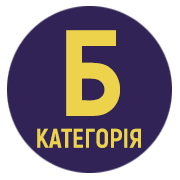PRINCIPLES OF FORMATION OF MUSICAL AND PERFORMING COMMUNICATIVE SKILLS OF HIGHER EDUCATION STUDENTS
Abstract
The article conducts a theoretical analysis of the system of principles for the formation of musical and performing communicative skills of higher education students majoring in ‘Musical Art’. It has been determined that the change of the traditional behavioural educational paradigm to a communicative and dialogical one requires the introduction of humanistic strategies in the content of higher art education, the creation of a cultural and educational environment in which the communicative potential of higher education students in the field of music performance will be creatively revealed. The article reveals that the communicative model of artistic communication in the process of music performance is based on a system of principles that serve as a methodological basis for the formation of an important professional quality of a musician as music performance communicative skills. It has been found that pedagogical science is based on a system of interrelated general didactic and specific teaching principles that are characteristic of teaching in a particular field of education, in particular, in the field of art education, so they are based on the peculiarities of teaching and upbringing through the arts. In this regard, a number of principles have been proposed and analysed that create a methodological basis for the implementation of the author's pedagogical concept of forming students' musical and performing communicative skills in order to justify the feasibility of its application in the professional training of higher education students. These are the principles of: cultural relevance; dialogical and value orientation of understanding; individualisation; reflexivity; projectivity in the choice of artistic and communicative strategies. It is proved that all the identified principles of forming the musical and performing communicative skills of higher education students are closely interrelated, their integrated application enhances each other's effect, which positively affects the formation of the studied phenomenon.
References
Гуральник, Н. П. (2011). Науково-педагогічна школа піаністів у теорії та практиці музичної освіти і виховання : навч.-метод. посіб. для вищих освітніх закладів. Київ : Вид-во НПУ імені М. П. Драгоманова. 276 с.
Жайворонок, Н. Б. (2006). Музичне виконавство як феномен музичної культури : автореф. дис. … канд. мистецтв. : 17.00.01. Київ. 19 с.
Зайцева, А. В. (2017). Художньо-комунікативна культура майбутнього вчителя музичного мистецтва : теорія методологія, методичні аспекти : монографія. Київ : Вид-во НПУ імені М. П. Драгоманова. 255 с.
Злотник, О. Й. (2019). Комунікативний простір музичного мистецтва України кінця ХХ – початку ХХІ століття : дис. … канд. мистецтвознавства: 26.00.01. Київ. URL: https://nakkkim.edu.ua/images/Special-ScienceCouncil/Materialy-Dysertaciy/2019/Zlotnyk/Zlotnyk-autoref.pdf
Козир, А. В., Федоришин, В. І. (2012). Вступ до акмеології мистецької освіти: навч.-метод. посіб. Київ: Вид-во НПУ ім. М. П. Драгоманова. 263 с.
Козяр, М. М., Коваль, М. С. (2013). Педагогіка вищої школи: навч. посіб. Київ: Знання. 327 с.
Коменський, Я. А. (2006). Велика дидактика. Закони добре організованої школи / Історія зарубіжної педагогіки : хрестоматія : навч. посіб. для студ. вищ. навч. закл. / Є. І. Коваленко, Н. І. Бєлкіна. Київ : Центр учбової літератури. С. 155–185.
Лупак, Н. М. (2020). Формування комунікативної компетентності майбутніх учителів мистецтва : засади інтермедіальної технології : монографія. Тернопіль : підручники і посібники. 452 с.
Мазур, Д. В. (2024). Принципи розвитку професійної рефлексії майбутніх керівників інструментальних колективів у процесі фахової підготовки. Мистецька освіта та розвиток творчої особистості. Вип. 2. С. 21–26. https://doi.org/10.32782/ART/2024-2-4
Мимрик, М. Р. (2024). Музично-виконавська комунікативність як педагогічний феномен у змісті інструментальної підготовки студентів факультетів мистецтв. Освітньо-науковий простір. Вип. 7 (2-2024). Т. 1. С. 108–119. https://doi.org/10.31392/ONP.2786-6890.7(2)/1.2024.
Олексюк, О. М., Ткач, М. М., Лісун, Д. В. (2013). Герменевтичний підхід у вищій мистецькій освіті : колект. моногр. Київ : Київ. ун-т ім. Б. Грінченка. 150 с.
Падалка, Г. М. (2008). Педагогіка мистецтва (Теорія і методика викладання мистецьких дисциплін). Київ : Освіта України. 274 с.
Приходько, Ю. О., Юрченко, В. І. (2012). Психологічний словник-довідник: Навч. посіб. Київ.
Рудницька, О. П. (2002). Педагогіка : загальна та мистецька : навч. посіб. Київ. 270 с.
Самойленко, О. І. (2003). Діалог як музично-культурологічний феномен : методологічні аспекти сучасного музикознавства : автореф. дис. … д-ра мистецтвознавства : 17.00.03. Київ. 36 с.
Філософський енциклопедичний словник (2002) / Шинкарук В. І., та ін. Київ, «Абрис». 742 с.
Ricoer, P. (1969), Le conflit des intrpretations. Essais d’hermeneutique. Paris, 1969.





